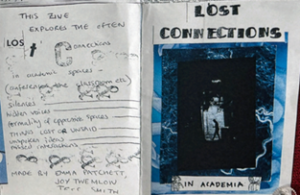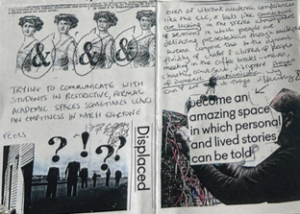
Earlier in the academic year, the Equality, Gender and Feminist Legal Studies Research Cluster hosted a zine-making workshop led by Joy Twemlow, Durham Law School, whose scholarship focuses on the zine-making process and feminist efforts on creating alternative spaces. It was attended by members of the research cluster who, collectively, produced two zines on the topic of academic practices within higher education institutions. In this blog post, I explore the zines produced during the workshop and reflect on the benefits of zine-making as a feminist practice within academia.
The workshop started with Joy providing the participants with a brief historical overview of zine-making within feminist legal research practice. Joy also bought zine-making materials such as coloured pens, papers, scissors, recycled newspapers and images, as well as a couple of zines as examples.[1]
I learnt during the workshop that zines, short for ‘fanzines’, are self-published DIY booklets somewhat similar to the scrapbooks, pamphlets, and manifestos used throughout the abolitionist and suffragist movements. They rose to prominence during the 1970s civil rights movement and subsequently became integral to the 1990s punk riot grrrl movement aimed at confronting sexism in punk rock music subcultures.[2] More recently, the accessibility of digital publishing has brought a renewed interest in zine-making as a medium for feminist critique of various spaces and practices, including academia.
Zines have historically been used as “resistive texts” that challenge mainstream narratives and provide a “safe space” where alternative perspectives are articulated and encoded norms made visible.[3] Women, gender minorities, and other marginalised groups may be particularly drawn to zine-making as it allows us to engage in creative self-expression and to speak for themselves in spaces where our lived experiences tend to be excluded.[4]
Within the rigid and restrictive spaces of academic publishing, zines can be a powerful means of self-expression due to their self-publishing nature – free of censorship and limitations.[5] This can make zine-making an empowering and liberating process. Additionally, zine-production can be used as a data collection tool in Participatory Action Research as a fun and practical way for research participants to express themselves on their own terms.[6] To me, what at first glance seemed somewhat fruitless drawings, suddenly became potentially powerful outputs in feminist-based scholarship because they challenge, by design, the still-dominant notion within academia that only positivist social science research leads to legitimate sources of knowledge.
Furthermore, zine-making can also be used as a pedagogical tool. They invite students to critically reflect on their lived experiences, and teach them that expressing those experiences is a valid method of knowledge-production.[7] Associated with efforts to decolonise and diversify, zines are also increasingly incorporated in museum and library collections as unconventional resources exposing us to new and authentic sources of knowledge typically dismissed within mainstream discourse.[8]
With the above-listed benefits in mind, we proceeded to split into two groups. We discussed in groups what we wanted to reflect on through our zines with a particular focus on what we would like to see changed within academia and why. We then flipped through the available zine-making materials Joy provided and cut images we decided were relevant.
By the end of the workshop, we undertook a collective reflexive exercise through which we generated a creative critique of patriarchal systems and hierarchies within academic settings. Our zines reflect some of our experiences which left us feeling outside the status quo, and what we might want to do about it. They contain an invitation for a collective evaluation and re-think of the extent to which academic activities, as conventionally designed and practised, are actually helping us reach our goals.
For example, the authors of one of the zines produced during the workshop explored “the often lost connections in academic spaces”, such as classroom and conferences. Figure 1 below shows zoomed in aspects of the integral zine. Reflecting on ways in which teaching spaces tends to be set up and their impact on our sense of belonging, one of our participants handwrote the following:
Trying to communicate with students in restrictive formal academic spaces sometimes leaves an emptiness in which everyone feels displaced.
Similarly, the zine invites us to reflect on how little we know about our audience as we prepare and deliver an academic presentation. There is a sense of grieving the missed opportunities of connection this almost inevitably leads to:
When I prepare my academic presentation I genuinely want to connect personally + conceptually with others. But it is so hard to do that when I know so little about my audience.
Figure 1: Extracts from the zine produced by Emma Patchett, Joy Twemlow and Jess Smith, ‘Lost Connections’.




As can be seen in Figure 2 below, the themes emerging in our second zine indicate a similar critique of lost opportunities due to the rigidity of academic setting. In line with feminist critique of neoliberal academia,[9] questioning the REF system and the ability to remain innovative in an environment of increasing time-pressures and exclusive access to funding. The authors of our second zine conclude their work by making known their ‘actual hopes’ including ‘being community-minded’, creating a positive change in the world, whilst at the same time ‘getting through Monday’, feeling valued and ensuring access to sexual and reproductive justice for all.
Figure 2: The second zine produced by BLS students and staff during the BLS Equality, Gender and Feminist Legal Studies Research Cluster zine-making workshop on 1 December 2023.

I personally never heard of zines before. Yet, I found the experience of creating one with faculty colleagues surprisingly satisfying. The very choice of carving out a few hours from our never-ending busy schedules felt daring, self-indulgent and liberating all at once. Intentionally stopping to critically reflect on some of our academic practices grounded me and gave me a sense of camaraderie with the other participants.
What we produced is not typically recognised in mainstream academia as legitimate knowledge production. As a doctoral student, watching more experienced academic staff enthusiastically engage in zine-making, and listening to their views regarding the ever-increasing pressures of an academic role was one of the most valuable aspects of the workshop. It affirmed my sense of belonging within the academy. In sharing some of our views, experiences, frustrations, dreams and aspirations within academia, we (re-)discovered we are not alone. Our experiences are valid, and zines can be a rewarding way of collectively expressing them. The zine-making process can offer us a sense of release, of hearing and of being heard, of building connections and carving together a way forward.
To this end, I would like to thank Joy Twemlow for leading the workshop, Dr Shaimaa Abdelkarim and Dr Charlotte Bendall for organising it, as well as to our BLS colleagues for their active participation and for allowing us to share the zines they produced.
N.B. It was fantastic to see female colleagues within BLS take on zining as a practice of reflection and self-expression. But, as it often seems to be the case with feminist work, I wondered what might have attracted our male colleagues to attend. I therefore end this blog with a wish and an open invitation: may our future workshops reflect the diversity of our staff.
About the author: Iulia Mirzac is a PhD Candidate at Birmingham Law School. Her doctoral research focuses on judicial assessments of victimhood within human trafficking adjudications. Alongside her PhD, Iulia is the PGR Lead of the BLS Equality, Gender and Feminist Legal Studies Research Cluster and a Research Associate at the Max Planck Institute for Law and Social Anthropology. She teaches Decolonising Legal Concepts at BLS and Immigration Law at Oxford Brookes University.
[1] See, for example: https://diyingender.webspace.durham.ac.uk/sample-page/.
[2] Maggie Matich, Elizabeth Parsons and Rachel Ashman, ‘Zine infrastructures as forms of organizing within feminist social movements’ (2024) 31(3) Gender, Work, and Organization 1049, 1050.
[3] Melanie Ferris, ‘Resisting Mainstream Media: Girls and the Act of Making Zines’ (2001) 21(1) Canadian Woman Studies/LesCahiers De La Femme 51; Elizabeth Keenan and Lisa Darms, ‘Safe Space: The Riot Grrrl Collection’ (2013) 76 Archivaria 55; cited in Matich et al (n 2) 1050.
[4] ‘Making Zines, Doing Feminism’ (Emily Taylor Center for Women & Gender Equity, 2024) https://emilytaylorcenter.ku.edu/making-zines-doing-feminism.
[5] Rosemary Clark-Parsons, ‘Feminist Ephemera in a Digital World: Theorizing Zines as Networked Feminist Practice’ (2017) 10(4) Communication, Culture & Critique 557, 560.
[6] Jade French and Emma Curd, ‘Zining as artful method: Facilitating zines as participatory action research within art museums’ (2022) 20(1) Action Research (London, England) 77, 78.
[7] Kimberly Creasap, ‘Zine-Making as Feminist Pedagogy’ (2014) 24(3) Feminist Teacher 155, 156.
[8] French and Curd (n 6) 78.
[9] See, for e.g: Maeve McKeown, ‘The View from Below: How the Neoliberal Academy Is Shaping Contemporary Political Theory’ (2022) 59(2) Society 99; The Res-Sisters, ‘Being an Early Career Feminist Academic: Global Perspectives, Experiences and Challenges’ in Rachel Thwaites and Amy Pressland (eds), Being an Early Career Feminist Academic: Global Perspectives, Experiences and Challenges (1st ed, Palgrave Macmillan UK 2017).
